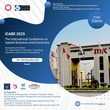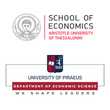-
- Conference
- Posted 4 days ago
16th Annual Financial Markets and Liquidity (AFML) Conference, Budapest, Hungary 15th -17th October 2025
Between 15 Oct and 17 Oct in Budapest, Hungary
-
- Workshop, Conference
- (Partially Online)
- Posted 1 week ago
International Conference on Applied Business and Economics - ICABE 2025 - 21th Edition - A HYBRID CONFERENCE
Between 3 Nov and 5 Nov in Kuwait City, Kuwait
-
- Conference
- Posted 2 weeks ago
41st RSEP International Multidisciplinary Conference
Between 1 Jul and 2 Jul in Shanghai, China
-
- Conference
- Posted 1 week ago
3rd World Conference on Data Science and Statistics
Between 16 Jun and 18 Jun in Amsterdam, Netherlands
-
- Conference
- Posted 2 weeks ago
Conference in honor of Professor Elyès Jouini
Between 4 Jun and 5 Jun in France
-
- Workshop, Conference
- Posted 2 weeks ago
9th Institutions, Trade and Economic Development (InsTED) Workshop
Between 20 Sep and 21 Sep in Edmonton, Canada -
- Conference
- Posted 1 day ago
9th International PhD Meeting in Economics 2025
Between 10 Jul and 11 Jul in Thessaloníki, Greece -
- Conference
- (Online)
- Posted 3 weeks ago
1st International Electronic Conference on Games (IECGA 2025)
Between 15 Oct and 16 Oct
-
- Conference
- Posted 1 month ago
1st International Conference on Applied Economics and Financial Issues (AEFI)
Between 28 Aug and 29 Aug in Thessaloníki, Greece
-
- Conference
- Posted 6 days ago
The 2nd International Conference on Finance and Behavioral Decision Making, November 12-14, 2025, Cluj-Napoca
Between 12 Nov and 14 Nov in Cluj-Napoca, Romania -
- Conference
- Posted 1 month ago
40th RSEP International Conference on Economics, Finance and Business
Between 23 May and 24 May in Paris, France
-
- Conference
- Posted 3 weeks ago
THE ITALIAN ECONOMIC ASSOCIATION 66th ANNUAL CONFERENCE
Between 23 Oct and 25 Oct in Naples, Italy
-
- Conference
- Posted 1 month ago
North American Conference on Islamic Finace: Social Impact of Islamic Finance
Between 17 Oct and 18 Oct in Houston, United States
-
- Conference
- Posted 2 weeks ago
The Beauty Trends & Innovations Conference 2025
24 Sep in London, United Kingdom -
- Conference
- Posted 1 month ago
CALL FOR PAPERS - Conference on “Fiscal and Monetary Policies for Inclusive Growth in Developing and Emerging Markets"
Between 16 Jul and 17 Jul -
- Conference
- Posted 4 weeks ago
Warsaw International Economic Meeting 2025
Between 25 Jun and 26 Jun in Warsaw, Poland -
- Conference
- Posted 1 month ago
2025 European Meeting of the Economic Science Association
Between 3 Sep and 6 Sep in Brno, Czechia -
- Conference
- Posted 1 month ago
The Corporate Communications Conference Europe
17 Jun in Amsterdam, Netherlands -
- Conference
- Posted 1 month ago
14th CompNet Annual Conference, 25-26 September 2025, Vilnius
Between 25 Sep and 26 Sep in Vilnius, Lithuania
-
- Conference
- Posted 1 month ago
9th International PhD Meeting in Economics 2025
Between 10 Jul and 11 Jul in Thessaloníki, Greece -
- Conference
- Posted 2 months ago
Frontiers of Causal Inference and Machine Learning
Between 8 Jul and 11 Jul in Lucca, Italy -
- Conference
- Posted 1 month ago
Institutions and Regional Development Conference
Between 25 Sep and 26 Sep in L'Aquila, Italy -
- Conference
- Posted 2 months ago
CALL FOR PAPERS - 18th YOUNG ECONOMISTS’ SEMINAR (YES)
Between 6 Jun and 8 Jun in Dubrovnik, Croatia -
- Workshop, Conference
- Posted 2 months ago
31st International Conference on Computing in Economics and Finance
Between 7 Jul and 9 Jul in Santiago, Chile -
- Workshop, Conference
- (Partially Online)
- Posted 1 month ago
1st GLOBAFA Conference - Budapest
Between 30 May and 31 May in Istanbul, Türkiye
Pagination








